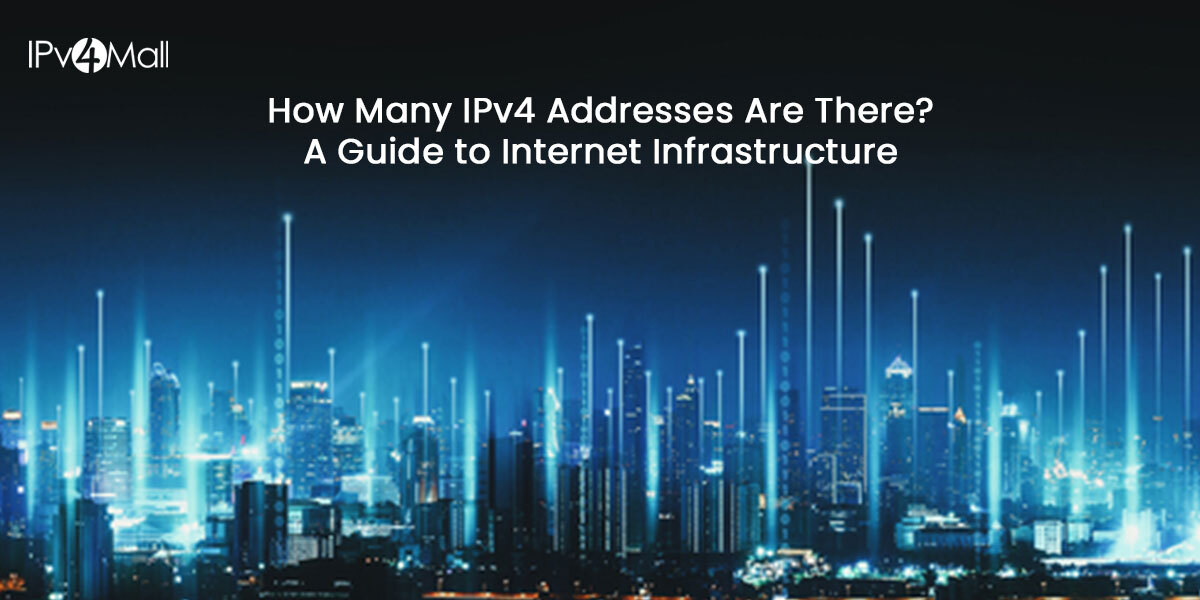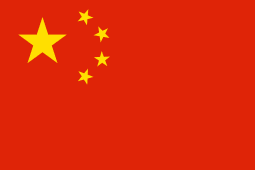![]()

March 28, 2024
How Many IPv4 Addresses Are There? A Guide to Internet Infrastructure
Have you ever wondered how your computer talks to other devices on the internet? It all boils down to a unique identifier called an IP address, a digital passport that allows devices to find each other in the vast online world. But with the ever-growing number of internet users and devices, a question arises: How many IPv4 addresses are there, and are we running out?
Unveiling the Limited Landscape of IPv4 Addresses
Let’s start by addressing the core question. There are, technically, 4,294,967,296 (or approximately 4.3 billion) possible IPv4 addresses. This number might seem enormous, but it’s important to remember that not all of them are available for public use. Large blocks are reserved for private networks, and special purposes like loopback (internal communication), and multicast (sending data to multiple devices).
Here’s the catch: This seemingly large pool of addresses pales in comparison to the exploding demand. The internet boom, coupled with the rise of mobile devices and the Internet of Things (IoT), has significantly outpaced the initial allocation of IPv4 addresses.
Delving Deeper: What Exactly is an IP Address?
Before diving into the reasons behind the shortage, let’s understand what an IP address is and how it functions. Imagine your home address – it uniquely identifies your location so mail and visitors can find you. Similarly, an IP address acts as a unique digital address for your device on the internet.
Think of it like a phone number, but instead of connecting voices, it connects devices and facilitates data exchange. Each device connected to the internet, from your laptop to your smart fridge, has a unique IP address assigned to it.
Why Are IPv4 Addresses Running Out?
There are two main reasons why IPv4 addresses are becoming scarce. Firstly, the addressing system itself has limitations. IPv4 utilizes 32 bits, translating to a finite pool of possible addresses.
Secondly, the initial allocation of these addresses didn’t anticipate the explosive growth of the internet. Back then, it was difficult to foresee the ubiquity of smartphones, tablets, and countless other internet-connected devices that now populate our digital world.
Imagine a city originally planned for a few thousand residents. With a tenfold increase in population, the limited housing capacity has become a major concern. The situation with IPv4 addresses is quite similar.
The Dawn of a New Era: Introducing IPv6
To address this growing issue, a new addressing system called IPv6 was developed. Unlike its predecessor, IPv6 boasts a massive address pool, utilizing 128 bits. This translates to a practically infinite number of addresses, enough to accommodate the ever-expanding digital landscape for years to come.
Think of it like moving from a quaint town to a sprawling metropolis with ample space for everyone. However, transitioning from IPv4 to IPv6 isn’t as simple as flipping a switch. Updating network infrastructure and ensuring compatibility with older devices takes time and coordinated effort.
So, Should You Be Worried?
The good news is that the transition to IPv6 is happening gradually. Most internet users won’t experience any significant disruptions.
The Impact on Users: Mostly Seamless Transition
For the average user, the switch to IPv6 will likely be invisible. Internet service providers (ISPs) are gradually upgrading their infrastructure to support both IPv4 and IPv6. This means your devices might automatically utilize IPv6 when available, without any noticeable change in your browsing experience.
The Bigger Picture: Ensuring a Healthy Internet Ecosystem
The bigger concern lies in ensuring a smooth transition for the entire internet ecosystem. A healthy internet relies on all devices – from websites to servers to user devices – speaking the same language. While IPv4 will likely be around for some time, widespread adoption of IPv6 is crucial for future growth and innovation.
The Road Ahead: The Future of IP Addressing
The future of IP addressing hinges on a collaborative effort to fully embrace IPv6.
Embracing IPv6: A Collaborative Effort
Governments, internet service providers, and technology companies all have a role to play. Investment in infrastructure upgrades, promoting IPv6 adoption among users, and developing technology that seamlessly works across both protocols are key steps.
Innovation and Efficiency: Optimizing Future Technologies
The vast address space of IPv6 opens doors for innovation. It allows for more efficient routing of data packets, potentially leading to faster internet speeds and improved network performance. Additionally, IPv6 simplifies network management and paves the way for the development of new Internet-based technologies, including the further expansion of the Internet of Things.
Conclusion
The internet is a constantly evolving landscape, and the transition from IPv4 to IPv6 is a testament to our ability to adapt and innovate. While the initial limitations of IPv4 might seem daunting, the development of IPv6 ensures a future with a practically limitless addressing space.
FAQs
1. Will I need to do anything to switch to IPv6?
In most cases, no. Your internet service provider will handle the technical aspects of the transition. You might need to update the firmware on your router if it doesn’t already support IPv6.
2. Can I check if my internet connection uses IPv6?
Several online tools can help you determine if your internet service provider offers IPv6 connectivity. Simply search for “IPv6 test” online.
3. Will IPv6 affect my internet speed?
In theory, IPv6 can potentially improve internet speeds due to more efficient routing of data packets. However, the actual impact on your speed depends on various factors, including your internet service provider’s infrastructure and network congestion.
4. What happens if I don’t have an IPv6 address?
While the internet will continue to function with IPv4 for some time, eventually, most websites and services will require an IPv6 address for optimal performance.
Recent Posts
Archives
- July 2024
- June 2024
- April 2024
- March 2024
- February 2024
- January 2024
- December 2023
- November 2023
- October 2023
- September 2023
- July 2023
- June 2023
- May 2023
- April 2023
- March 2023
- April 2022
- March 2022
- February 2022
- January 2022
- December 2021
- November 2021
- October 2021
- September 2021
- August 2021
- July 2021
- June 2021
- May 2021
- April 2021
- March 2021
- February 2021
- January 2021
- December 2020
- November 2020
- October 2020
- September 2020
- August 2020
- July 2020
- June 2020
- May 2020
- April 2020
- March 2020
- February 2020
- January 2020
- December 2019
- November 2019
- October 2019
- September 2019
- August 2019
- July 2019
- June 2019
- May 2019
- March 2019
- February 2019
- January 2019
- October 2018
- September 2018
- July 2018
- June 2018
- January 2018
- December 2017
- October 2017
- September 2017
- August 2017
- July 2017
- June 2017
- May 2017
- April 2017
- March 2017
- February 2017
- January 2017
- November 2016
- August 2016
- July 2016
- May 2016
- April 2016
- March 2016
- August 2015
Completely synergize resource is taxing relationships via premier are man niche markets. Professionally cultivate one to one customer.
Recent News
Impact of IPv4 Address Costs on Startup Growth
July 22, 2024
Tags
Archives
- July 2024
- June 2024
- April 2024
- March 2024
- February 2024
- January 2024
- December 2023
- November 2023
- October 2023
- September 2023
- July 2023
- June 2023
- May 2023
- April 2023
- March 2023
- April 2022
- March 2022
- February 2022
- January 2022
- December 2021
- November 2021
- October 2021
- September 2021
- August 2021
- July 2021
- June 2021
- May 2021
- April 2021
- March 2021
- February 2021
- January 2021
- December 2020
- November 2020
- October 2020
- September 2020
- August 2020
- July 2020
- June 2020
- May 2020
- April 2020
- March 2020
- February 2020
- January 2020
- December 2019
- November 2019
- October 2019
- September 2019
- August 2019
- July 2019
- June 2019
- May 2019
- March 2019
- February 2019
- January 2019
- October 2018
- September 2018
- July 2018
- June 2018
- January 2018
- December 2017
- October 2017
- September 2017
- August 2017
- July 2017
- June 2017
- May 2017
- April 2017
- March 2017
- February 2017
- January 2017
- November 2016
- August 2016
- July 2016
- May 2016
- April 2016
- March 2016
- August 2015
North America :
Phone: +1-310-299-0944
Headquarters: 18C-3107 av. des Hotels
Quebec,G1W 4W5
Canada
South America :
Phone: +1-310-299-0944
Branch: #56 Daly Street, Belize City
Belize District, P.O. Box 1825
Belize











Recent Comments